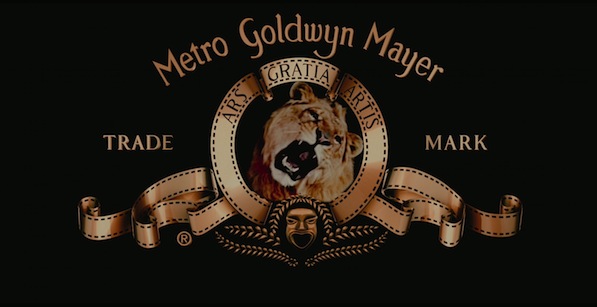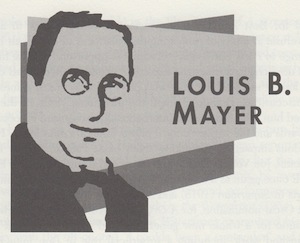
Born: July 4, 1885, Minsk, Russia
Died: October 29, 1957, Los Angeles, CA
Talent is like a precious stone, like a ruby or a diamond. You take care of it. You put it in a safe, you clean it, polish it, look after it.
—L. B. Mayer
Louis B. Mayer joined his father’s junk business in Boston right out of high school, but an offer in a 1907 advertisement put him into the nickelodeon business at a bargain price. By 1918, he was Massachusetts’s largest movie theater owner, specializing in the presentation of top-quality films for wealthy patrons. Mayer started expanding his empire by distributing D.W. Griffith’s The Birth of a Nation (1915) in the New England area and made a small fortune from its popularity. To further speed the supply of pictures to his theaters, he moved his operations to Hollywood and opened the Metro Pictures Corporation in 1917. He began production with his only star, Anita Stewart, in Virtuous Wives (1918).
A three-way merger in 1924 gave Sam Goldwyn, Marcus Loew and Mayer a new company, Metro-Goldwyn-Mayer (MGM). Largely because of the production savvy of Irving Thalberg and the consistent style of Cedric Gibbons, MGM dominated the film industry during the twenties and thirties, and Mayer’s salary signaled the financial strength of the movie industry; in 1938 he was the highest paid person in a U.S. corporation, taking home more than a million and a quarter dollars.
Another sign of Mayer’s power was his ability to quash the careers of his employees, no matter how successful or beloved they had become. Director Erich von Stroheim, actor John Gilbert and seductress Mae West all suffered the wrath of Mayer’s short fuse and saw their careers ruined permanently and forever. Even producer Irving Thalberg, whose inherent likeability and business acumen were legendary, was suffocated by the jealousy of his boss. However, these displays quickly established the power of studios in the days of the “star system,” and Mayer and his contemporaries exerted much of their control through restrictive contracts that put actors at the mercy of their bosses.
Mayer’s leadership within the film industry was critical to the formation of the Motion Picture Producers and Distributors of America, Inc., a puppet organization conceived by Mayer to duck government regulation by convincing lawmakers that the picture business itself could police the objectionable subject matter in Jazz Age films. The MPPDA, which created the Hays Office and Production Code, became the perfect venue for Mayer’s conservative politics, often the subject of discussion at the massive parties he held for the organization at his palatial residence.
One such discussion at his home was the impetus for the founding of the Academy of Motion Picture Arts and Sciences. Seeking to recognize the contributions of the industry’s growing number of trade unions, Mayer felt a group of representatives from each union could form an “academy” and select a member who exemplified the best of the year’s output through a lavish event. The first Oscar award ceremony was held in 1927. For several years, the Oscars were hand-picked by a small group of union members and studio executives—and, of course, Mayer himself. In fact, he held an uncontested veto power over who received Oscars until 1941, when an outstanding performance by Bette Davis was passed over at Mayer’s insistence, inflaming the Screen Actors Guild. Since then, the Academy has adopted a formal-based nomination process and a secret ballot for the final vote. The winners’ names are sealed in envelopes that are not opened until one fateful night of each year. The Academy Awards was a stroke of genius, giving the industry a much-needed unity and giving great achievers a chance at worldwide recognition.
Looking for every opportunity to sway industry affairs, Mayer even became California’s chairman of the Republican Party in the 1930s. after a brief and failed attempt in 1937 by Thalberg and William Fox to stage a coup and dethrone Mayer, he continued on at MGM until he stepped down from the helm of his own volition in 1948. He remained as vice president and general manager until 1951, also acting as adviser to Mike Todd’s Cinerama corporation briefly before retiring completely by 1953.
Few individuals have ever controlled so many aspects of the film industry as L.B. Mayer. As the absolute rule of the fabled Hollywood star system, he ran Metro-Goldwyn-Mayer like a grand patriarch, ruthlessly punishing disloyalty among his children and indefatigably defending the members of his family against scandal and rumor. His personal values shaped the films of MGM in their heyday; Mayer was famous for removing all controversial material from popular novels to turn them into pure escapist fare. In keeping with the virtues of patriotism and family, MGM pictures generally reflected Mayer’s penchant for wholesomeness. Mayer was committed to the best talent money could buy, and he scouted pretty girls and dashing men the world over, discovering Greta Garbo, Joan Crawford, Rudolph Valentino and Clark Gable. Grooming these stars became his everyday mission. Molding public opinion became a sideline passion. Reigning over Hollywood became an obsession. L.B. Mayer was the most powerful executive of the largest and most prestigious film studio for more than forty years.
In 1932, when the famous platinum blond starlet Jean Harlow went home to find her husband dead from suicide, the first call she made was to Mayer, who quickly rushed over to comfort Harlow and defuse any potentially adverse publicity. A scandal was thwarted, and Harlow’s career continued on unaffected. The paternal Louis B. Mayer had taken care of everything.
To read all the republished articles from ‘The Film 100,’ go to Reintroducing the Film 100 here on Keyframe.




